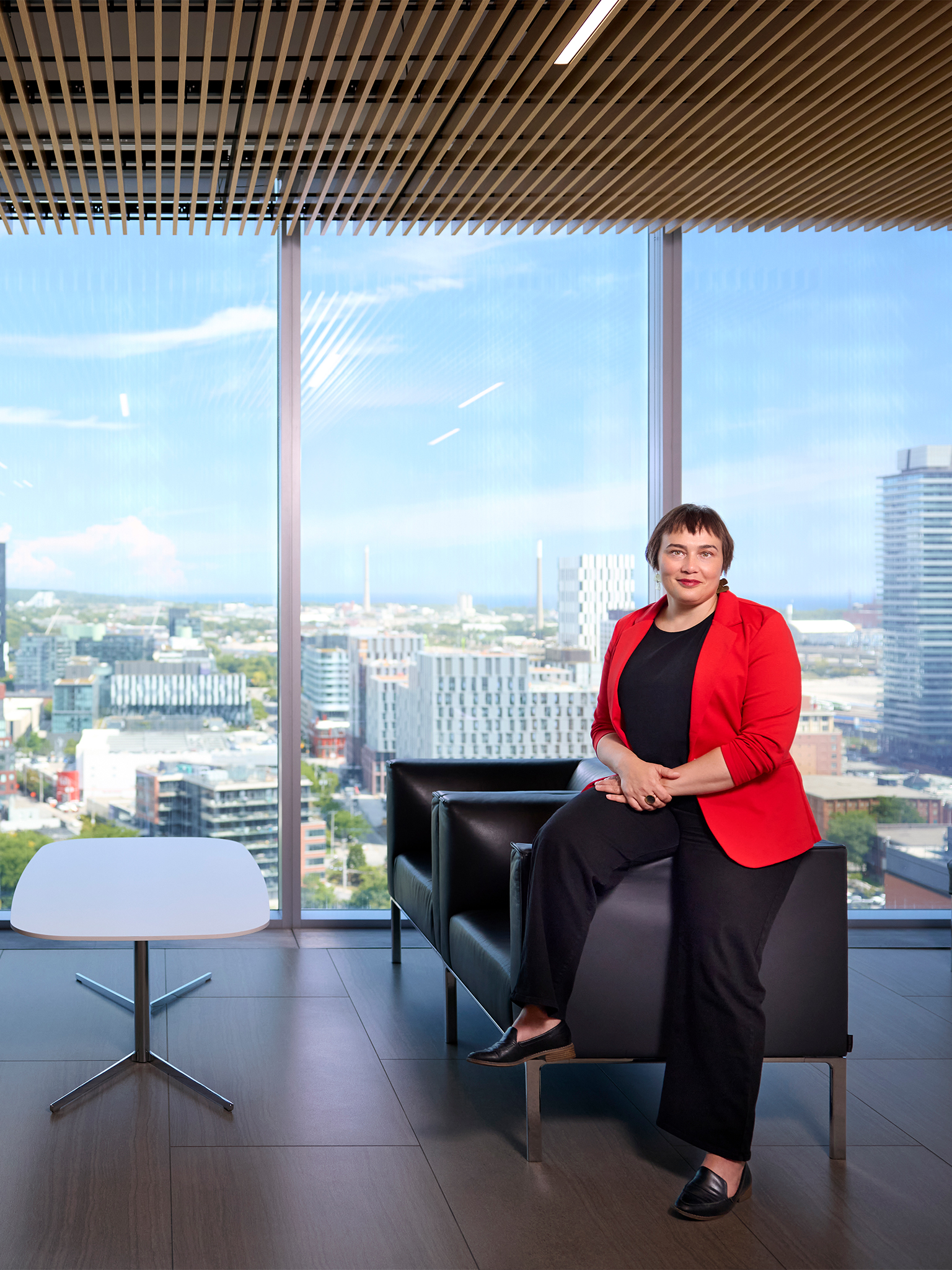Newsmaker
by David Silverberg
photography by Mike Ford
Angela Pacienza (BA ’05) remembers what it felt like to chase stories across campus, juggling classes and late-night deadlines at the Excalibur, York’s student newspaper.
Two decades later, she’s still chasing stories – only now, the stakes are national, and the future of journalism is on the line.
As executive editor at the Globe and Mail, Pacienza moves through the King Street East newsroom with the same curiosity she brought to York, greeted by nods and quick smiles from colleagues who know the pressure and unpredictability of the job. There’s camaraderie here, but everyone understands the business is tougher than ever.
Social media and their algorithms are built for entertainment purposes, and they do a great job at sucking people in. Their success proved that entertainment and dopamine hits are what make people feel good
The landscape she navigates today would have been unimaginable when she was gluing together pages at the student paper. The collapse of print, the flight of advertising to tech giants and the relentless churn of misinformation have left newsrooms smaller and audiences more skeptical. A recent Reuters Institute report found that just 14 per cent of Canadians now read a print-based news source, down from 33 per cent in 2017 – a stark measure of how quickly the ground has shifted.

“Social media and their algorithms are built for entertainment purposes, and they do a great job at sucking people in,” Pacienza says. “Their success proved that entertainment and dopamine hits are what make people feel good. And as an industry, we haven’t always done a good job at meeting people where they are, but we’re very strong at fact-based storytelling.”
At the Globe, that means adapting – doubling the size of the health team, launching an “Ask the Doctor” column to answer questions about Ozempic or Lyme disease and investing in more life and culture coverage. “We are seeing readers return to us because social media networks don’t often give people what they need, and they might not be sure if they’re actually getting sound advice on areas like personal finance. That’s why our business reporters help make sense of the world, and offer information to readers that isn’t pumped out by an AI technology. Half the stuff on TikTok isn’t even true, but at the Globe, stories based on truth and science are what we do.”
Pacienza’s leadership is practical and forward-looking. She’s quick to remind her team – and the next generation – that the core of journalism hasn’t changed. “I tell J-school graduates that the way we deliver our journalism may have changed, but the craft itself isn’t different. You’re still interviewing people and telling stories. You still have to be a strong storyteller. We are curious about the world, we are constantly asking questions and there are opportunities for journalists to help answer those questions.”
She’s also realistic about the challenges. “What needs to be done is ensuring our journalists meet folks where they are, and address what they are worrying about. There is a lot of war and bad news, but also there is good news out there, which is why we’ve invested in doing more solutions-based journalism.” The Globe’s new “Mastering It” series profiles Canadians excelling at their craft – like the world’s top female lawn bowler – offering readers a sense of possibility alongside the headlines.

Pacienza was drawn to journalism as a child, watching her mother battle a serious illness and feeling compelled to dig for answers. That instinct to research, question and explain shaped her time at York and propelled her through a career that included pioneering digital news at the Canadian Press before joining the Globe in 2012. By her side through it all has been her husband, Derek Chezzi (BA ’03), whom she met when both were undergrads at York; he now teaches journalism at Centennial College. Together, they have two children.
Inside the newsroom, Pacienza is known for her approachability and the respect she shows her team, even as she pushes for innovation. Melissa Stasiuk, now head of experience at the Globe, credits Pacienza for helping the newsroom adapt to new challenges. She recalls a time when Pacienza organized a day-long meeting for the life and culture team, giving everyone space to connect and share their goals. “Angela helped us build an understanding of how everyone can work together and leverage resources across the newsroom to create the strongest journalism,” Stasiuk says. “You could feel the positive energy and excitement in the room.”
There is a lot of war and bad news, but also there is good news out there, which is why we’ve invested in doing more solutions-based journalism
Pacienza is also a champion for young journalists, especially those who come up through student media. “When I see a young applicant’s CV mention they were a news editor at their student paper, I know that is someone that cares deeply about media and that they got the best training possible. That kind of student-newspaper training is valuable, and sometimes those writers want it twice as much. Why? Because they are also getting other degrees, say in political science or English, and they are doing journalism at the same time, so they are curious and passionate, and those are people we want in our newsrooms.”
For Pacienza, that passion and curiosity are essential as journalism faces an uncertain future. “As the net becomes more like a garbage dump, places like the Globe become an alternative for readers to find out what exactly is true, to read stories from reputable writers.” For her, journalism’s future isn’t about nostalgia for what’s been lost, but about building trust and relevance for what comes next.
“I like learning about new things every single day,” she says. “I love being able to shape what we should care about, and bring forward stories that reveal something essential about Canada.” ■
— With files from Deirdre Kelly